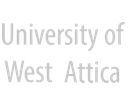Perception of plagiarism among undergraduate students in Greek Universities
Abstract
Abstract:
Purpose - The aim of the research is to discover, mainly, the opinions and perceptions of undergraduate students in Greek Universities regarding plagiarism.
Design/methodology/approach - This research attempts to discover not only the opinions and perceptions but also the proposals of undergraduate students in Greek Universities regarding plagiarism. The research method that was used for the survey is quantitative, with the use of questionnaires. A total of 467 questionnaires were collected by students from all Greek Universities and the majority of the scientific fields.
This research is an attempt to collect data regarding the students' perceptions of the essence and concept of plagiarism, their opinions about the factors that lead students to plagiarize or to plagiarism and the consequences that the Universities where they study impose. In addition, through the questionnaire, students had the opportunity to express their proposals about the methods they think are appropriate for plagiarism to be prevented effectively.
The main objective of this research is to portray the extent of the problem of plagiarism in Greek Universities. Additionally, it aims to contribute to the problem’s solution and create the necessary policies and mixture of methods that will lead to the required education for students to avoid plagiarism.
Findings – The research revealed various valuable findings. It is worth pointing out that the vast majority of the undergraduate students replied that they knew the term plagiarism (98,3%). On the other hand, below half the student population said they had not been trained in academic writing and, consequently, how to avoid plagiarism.
Originality/value - The paper presents Greek Universities' undergraduate students' perceptions of plagiarism. Remarkably, the collected data outcome is from all Greek Universities.
Keywords
References
Sengupta, S. (2015). Copyright infringement & plagiarism: are they really two sides of a coin? Challenges in 21st century librarianship, 9th-10th/January 2015. Principal, C.T. Bora College, Shirur, Dist. Pune: Maharashtra.
Sentleng, M. P. & King, L. (2012). Plagiarism among undergraduate students in the Faculty of Applied Science at a South African Higher Education Institution. South African Journal of Libraries and Information Science, 78(1), pp. 57-67. Available at: https://journals.co.za/doi/pdf/10.10520/EJC129278
Ali, A. M. E. T., Abdula, H. M. D. & Snasel, V. (2011). Overview and comparison of plagiarism detection tools. Datesco, pp. 161-172.
Hexham, I. (2013). The plague of plagiarism: Academic plagiarism defined. Calgari: Univeristy of Calgary. Available at: https://www.researchgate.net/profile/Irving-Hexham/publication/236899249_The_Plague_of_Plagiarism_Academic_Plagiarism_Defined_Originally_published_as_On_Plagiarism_and_Integrity/links/00b4951a21c5e03a4c000000/The-Plague-of-Plagiarism-Academic-Plagiarism-Defined-Originally-published-as-On-Plagiarism-and-Integrity.pdf
Marjanovic, M., Tomasevic, V. & Zivkovic, D. (2015). Anti-plagiarism software: usage, effectiveness and issues. International Scientific Conference of IT and Business-Related Research-SINTEZA, Singidunum University, pp. 119-122.
Sharma, B. K. (2007). Plagiarism among university students: intentional or accidental?. Journal of NELTA, 12(1 & 2), pp. 134-141. Available at: Plagiarism_among_university_students-libre.pdf (d1wqtxts1xzle7.cloudfront.net)
Evering, L. C. & Moorman, G. (2012). Rethinking plagiarism in the digital age. Journal of Adolescent and Adult Literacy, 56(1), pp. 35-44. DOI: https://doi.org/10.1002/JAAL.00100
Gullifer, J. & Tyson, G. A. (2010). Exploring university students' perceptions of plagiarism: a focus group study. Studies in Higher Education, 35(4), pp. 463-481. Available at: https://www.tandfonline.com/doi/pdf/10.1080/03075070903096508
Blum, S. D. (2009). Academic integrity and student plagiarism: A question of education, not ethics. The Chronicle of Higher Education, 55(24), A35. Available at: Academic Integrity and Student Plagiarism: a Question of Education, Not Ethics - Commentary - The Chronicle of Higher Education (d1wqtxts1xzle7.cloudfront.net)
Hasan, N. & Khan, N. H. (2018). Internet and increasing issues on plagiarism. Shrinkhla Ek Shodhparak Vaicharik Patrika, 5(12), pp. 125-131.
Gomez, J., Salazar, I. & Vargas, P. (2013). Dishonest behavior and plagiarism by university students: An application to management studies. Procedia-Social and Behavioral Sciences, 83, pp. 766-770. DOI: https://doi.org/10.1016/j.sbspro.2013.06.144
Klein, D. (2011). Why learners choose plagiarism: A review of literature. Interdisciplinary Journal of e-learning and learning objects, 7(1), pp. 97-110. Available at: https://www.learntechlib.org/p/44732/
Badge, J. & Scott, J. (2009). Dealing with plagiarism in the digital age. Synthesis, pp. 1-18. Available at: https://evidencenet.pbworks.com/f/Badge_Scott_plagiarism.pdf
Bahadori, M., Izadi, M. & Hoseinpourfard, M. (2012). Plagiarism: Concepts, factors and solutions. Journal of Miitary Medicine, 14(3), pp. 168-177. Available at: https://militarymedj.ir/browse.php?a_id=1049&sid=1&slc_lang=en
Comas-Forgas, R. & Sureda-Negre, J. (2010). Academic plagiarism: Explanatory factors from students’s persperctive. Journal of Academic Ethics, 8, pp. 217-232. Available at: https://link.springer.com/article/10.1007/s10805-010-9121-0
Walker, J. (1998). Student plagiarism in Universities: What are we doing about it?. Higher Education Research & Development, 17(1), pp. 89-106. DOI: https://doi.org/10.1080/0729436980170105
McCabe, D. L., Trevino, L. K. & Butterfield, K. D. (2001). Cheating in academic institutions: A decade of research. Ethics & Behavior, 11(3), pp. 219-232. DOI: https://doi.org/10.1207/S15327019EB1103_2
Halak, B. & El-Hajjar, M. (2019). Plagiarism detection and prevention techniques in engineering education. Higher Education Pedagogies, 4(1), pp. 197-208. DOI: https://doi.org/10.1080/23752696.2018.1563757
Berlinck, R. G. (2011). The academic plagiarism and its punishments-a review. Revista Brasileira de Farmacognosia, 21(3), pp. 365-372. DOI: https://doi.org/10.1590/S0102-695X2011005000099
European Union (2013). Comparison of policies for academic integrity in higher education across the European Union. Available at: http://plagiarism.cz/ippheae/files/D2-3-00%20EU%20IPPHEAE%20CU%20Survey%20EU-wide%20report.pdf
Kokkinos, D. & Koulouris, A. (2019). Plagiarism: initial research findings in undergraduate students. Journal of Integrated Information Management, 4(1), 2019, pp. 18-23. DOI: 10.26265/jiim.v4i1.4342
Avramidou, E. (2014). Web applications of information and communication technologies in education: the case of plagiarism. Alexandroupoli: Democritus University of Thrace (Doctoral Dissertation) (In Greek). Available at: https://www.didaktorika.gr/eadd/handle/10442/39218
DOI: 10.26265/jiim.v6i2.4504
Refbacks
- There are currently no refbacks.






